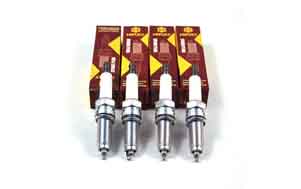Dec. 25, 2020
The Importance Of Spark Plugs
Spark plugs, as many people know, seem not amazing, but their effects cannot be ignored. The spark plug is the key to the ignition system of a car, and the ignition system is the key point of the engine. The spark plug is a device that ignites the mixed gas of gasoline and air that enters the engine. It works under severe conditions of high temperature and high pressure. It is one of the vulnerable parts of gasoline engines. It plays a very important role in the operation of the engine whether a car is fuel-efficient or not and whether it runs smoothly all have a lot to do with it. The performance of the spark plug is related to the working performance and efficiency of the vehicle. However, the formation of carbon deposits causes various problems in spark plugs. So, how to maintain the spark plug to make the engine more "powerful"?
1. In the normal operation of the engine, gasoline and engine oil that normally enters the combustion chamber cannot be completely burned in the cylinder under the condition of insufficient oxygen supply, resulting in oil fume and lubricating oil burnt particles. When the engine continues to run, further oxidation becomes gum. Stick firmly on the top of the piston, the piston ring, the back of the valve, the inner surface of the intake pipe and the combustion chamber, etc. (Now the overlap angle of the intake and exhaust valves of the engine is getting larger and larger, especially the variable-advance engine also causes carbon deposits. The main reason, of course, motivation will also be strengthened). Under the repeated action of high temperature, the colloid becomes asphaltene, resinous, and carbonaceous to form a carbon deposit.
2. Crankcase ventilation setting. To prevent air pollution, automotive design engineers introduce the exhaust gas from the engine directly into the intake manifold and enter the combustion chamber along with fresh air for combustion. The high-temperature oil vapor fills the intake manifold together with fresh air, one part is attached to the pipe wall and the back of the valve, and the other part is mixed with the injected fuel at the intake valve along with the intake flow to form a mixed vapor, which enters the combustion chamber and is burned out.
The air quality is poor. Because the inhaled air contains fine dust, it cannot be completely filtered out at the air filter, and the oil and gas will wash the back of the valve along with it, causing fine scratches after a long time. The fine particles and the lubricating oil from the crankcase are stored in the scratches and form a lacquer at high temperature, which accumulates for a long time and mixes with the wax and other components in the fuel to form carbon deposits.
3. During the storage and transportation of gasoline, it is easy to oxidize with the air to form a colloidal substance, or the content of colloid in the gasoline itself is very high (poor gasoline quality), which enters with the gasoline through the fuel supply system of the vehicle the inside of the combustion chamber, after burning with gasoline, it will cause a lot of carbon deposits in the fuel supply system's injectors, engine combustion chambers, piston ring grooves, spark plugs, intake valve backs, intake ducts, and other parts.
4. The congested urban road conditions make the vehicles always go and stop, the engine cannot run at high speed, the fuel or the lubricating oil that enters the combustion chamber cannot be burned 100%. The unburned part of the oil forms a gum under the effect of high temperature and oxygen, adheres to the surface of parts inside the engine, and then forms carbon deposits after high temperature.
5. Determined by the control characteristics of the EFI engine, the cylinder works every time, fuel is injected, and then ignited. When we extinguish the engine, the ignition is immediately cut off, but the gasoline sprayed in this working cycle cannot be recycling, and it can only be attached to the intake valve and the wall of the combustion chamber. The gasoline is easy to volatilize, but the wax and gums in the gasoline are left. Over time, the wax and gums in the gasoline will accumulate and thicken. When heated, it hardens and forms carbon deposits.

When the car travels to a certain number of kilometers, the spark plug will produce carbon deposits and the electrode gap will increase. Carbon deposits will increase engine fuel consumption, and the increased spark plug gap will cause insufficient ignition energy and cause difficulty in starting. Therefore, regular inspection and maintenance of spark plugs can extend the life of the engine.
In addition, carbon deposits can cause abnormal phenomena such as poor engine operation, unstable idle speed, poor acceleration, rapid refueling and tempering, excessive exhaust gas, and increased fuel consumption. If it is more serious, the valve will not be closed tightly, and a certain cylinder will not work completely because of no cylinder pressure, or it even sticks to the valve so that it will not return. At this time, the valve and the piston will interfere with movement, which will eventually damage the engine.
We are spark plugs suppliers. Please feel free to contact us.
Quick Links
Tel.: +86 135 7412 6921
Mob.: +86 135 7412 6921
E-mail: hifuly@foxmail.com
Skype: linda.hava
WhatsApp: +86 135 7412 6921
QQ: 2850162377
Follow Us